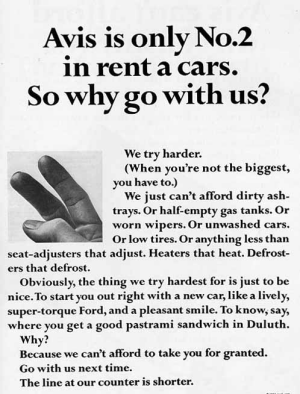Ranked Number Two and Loving It

Avis was #2. They tried harder.
And Hertz had a field day with them.
When the theme of your ads is that you’re almost good enough, it’s not hard for competitors to knock back. Hertz mocked Avis for having half the locations and half the selection, and turning it into a selling point. If you’re #2 even though you try harder, that makes you an underdog—but it’s also two reasons to assume that the competition is better.
Not so for search engines. If I could, I’d rank #2 for every query I’m targeting.
I don’t buy the idea that I’m fighting my way to the top of the search engine rankings, so I can get the most traffic, so I can get the most conversions. I’m just targeting the bottom line.
I think I’m fighting to do two things: get people to like whatever product I’m selling, and get them to the “checkout” page.
Search visitors are good, but they’re not the best possible visitor—in most cases, they aren’t familiar with the brand name. So I have to convince them that the product they’re investigating is worth the money, and that they ought to get it right now.
Which is where those #2 rankings come in.
If my link-building results in a post on an authoritative blog, lauding my product, it’s likely to be far more convincing than anything I could say.
Link-building on blogs is a long trip to the center of the visitor’s field of vision: start at the bottom of the page with comments, migrate up to the side with a sidebar link, then end up in the body of the post, then (if you’re really good) get a whole post written about you.
In the last case, that whole post is the best possible landing page. It’s all about you, but it’s not by you. If your visitor wants more information, your site can provide it; your site can’t provide authoritative recommendations, though.
SEO is increasingly a misnomer. I don’t just optimize for search engines—I try to make sure that whether a searcher starts at Google, a directory, a news site, or a personal blog, they end up where I want them, and they’re convinced that it’s a good thing along the way.
October 1st, 2009 at 12:00 pm
Avis' campaign was a brilliant one, no matter what Hertz did. At the time Hertz was by far #1 in the industry (by every measure), and Avis was down in the swamp with the countless other small rental car companies. In terms of market share, Avis wasn't really any bigger than its competitors, and consumers couldn't tell it apart from any other company.
But, Avis was actually #2 in one measure: fleet size. Only Hertz had more cars than Avis. So, Avis advertised the heck out of this. Hertz may have taken some shots at them (and by doing so raised the profile of Avis' campaign), but in consumers' minds, Avis went from being just one of countless so-so rental car companies to the strong underdog that was nipping at Hertz's heels, whether or not this was true to start.
Over time, reality tended to follow perception, and Avis did emerge from the pack to be a much larger player in the rental car biz.
October 1st, 2009 at 7:00 pm
Avis' campaign was a brilliant one, no matter what Hertz did. At the time Hertz was by far #1 in the industry (by every measure), and Avis was down in the swamp with the countless other small rental car companies. In terms of market share, Avis wasn't really any bigger than its competitors, and consumers couldn't tell it apart from any other company.
But, Avis was actually #2 in one measure: fleet size. Only Hertz had more cars than Avis. So, Avis advertised the heck out of this. Hertz may have taken some shots at them (and by doing so raised the profile of Avis' campaign), but in consumers' minds, Avis went from being just one of countless so-so rental car companies to the strong underdog that was nipping at Hertz's heels, whether or not this was true to start.
Over time, reality tended to follow perception, and Avis did emerge from the pack to be a much larger player in the rental car biz.